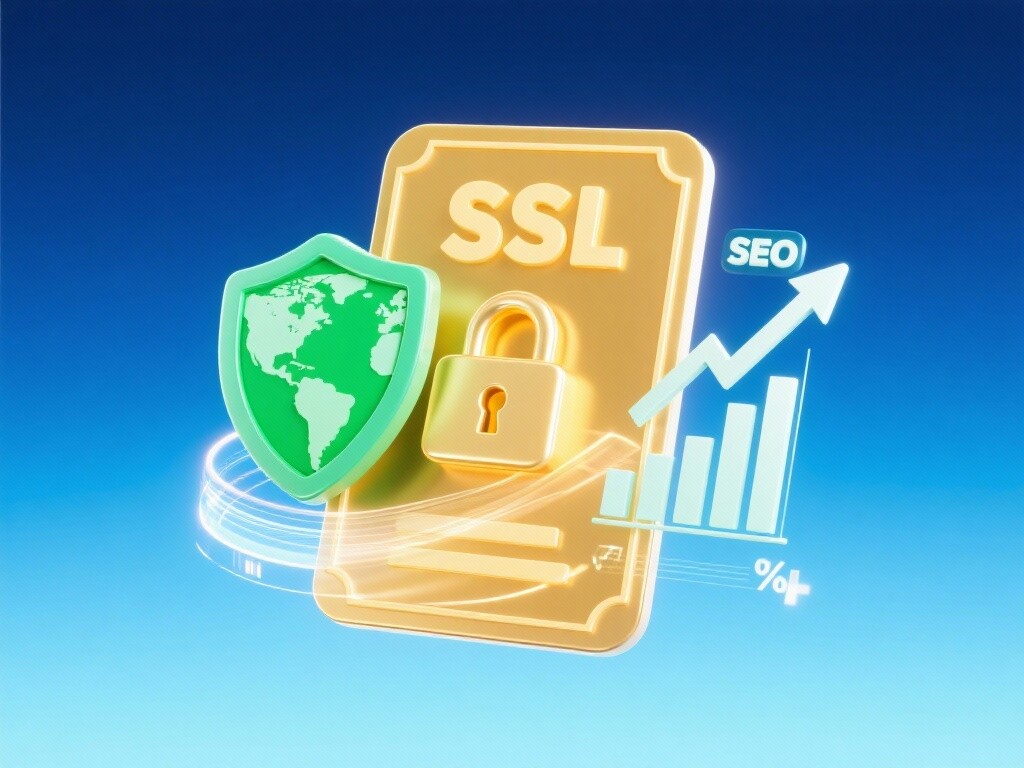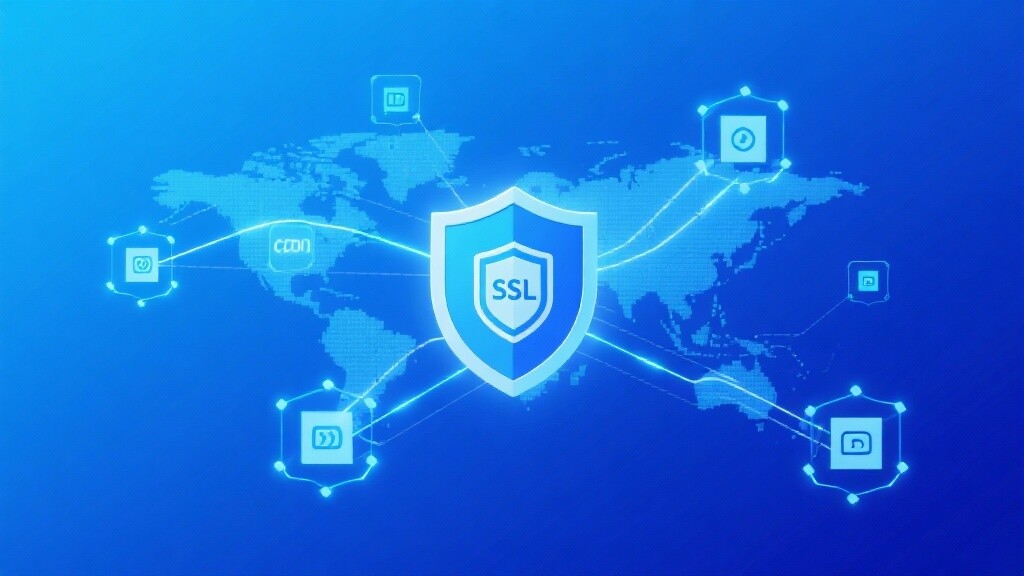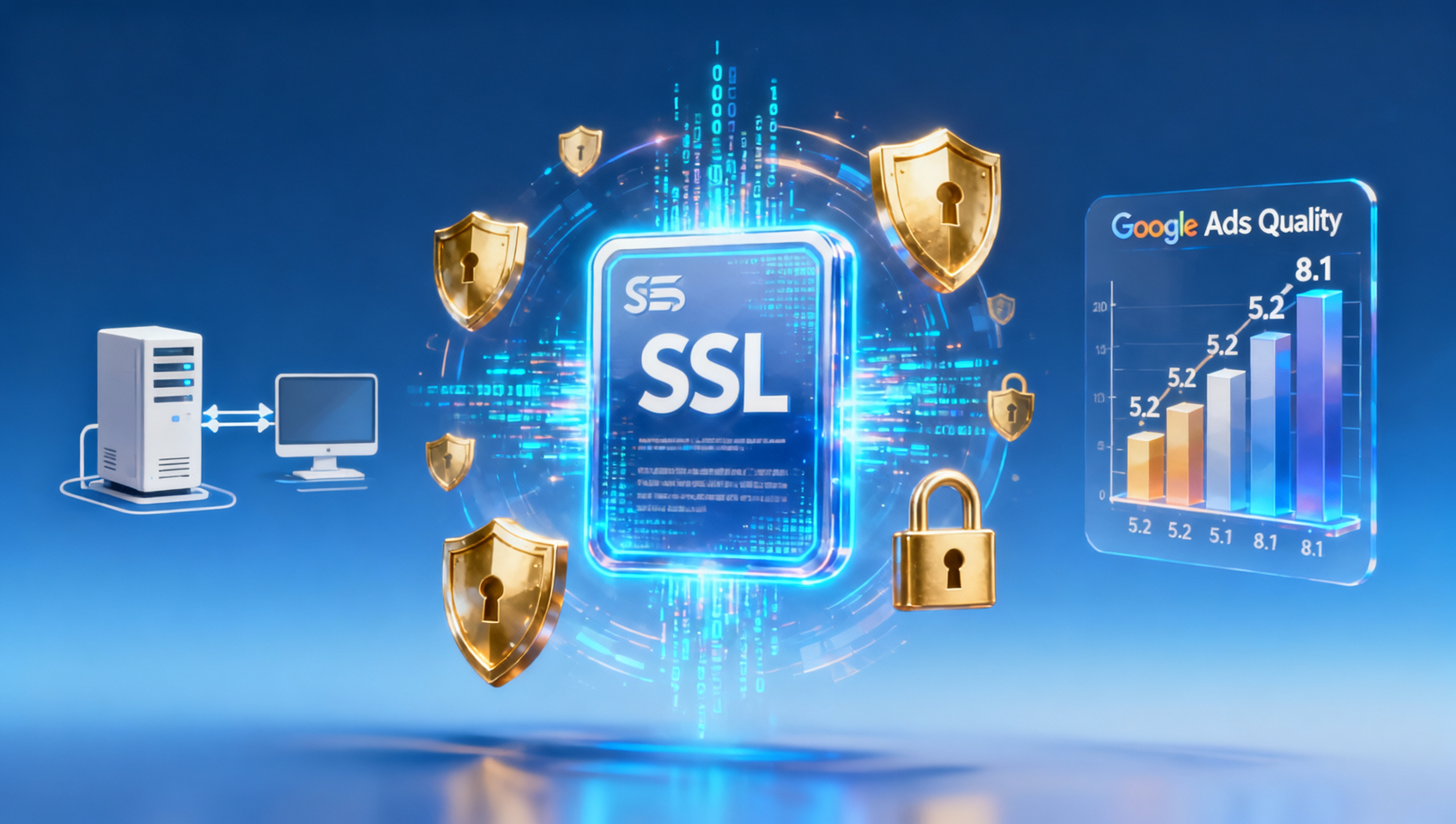1. The Authoritative Definition, Strategic Core, and Development History of SSL Certificates for Foreign Trade Independent Websites
1. The Authoritative Definition and Elements of SSL Certificates for Foreign Trade Independent Websites
SSL certificates for foreign trade independent websites (Secure Sockets Layer Certificate, now mostly TLS certificates) are a type of **digital certificate** used to verify the identity of a server (independent website) and establish **an encrypted connection (HTTPS)** between the browser and the server. Core elements include: **public and private keys, certificate authority (CA) signatures, and encryption algorithms**. In foreign trade, it serves as the foundation for **data confidentiality, data integrity, and server identity authentication**.
2. The 3 Indispensable Strategic Values of SSL Certificates
For foreign trade independent websites, SSL certificates have the following strategic values:
- **SEO Ranking Weight:** Google explicitly listed HTTPS as a **ranking signal** as early as 2014. Websites without certificates will directly impact global rankings.
- **User Trust and CRO:** Browser warnings for non-HTTPS websites directly lead to customer loss, affecting inquiry and order conversion rates (CRO).
- **Data Security Compliance:** Ensuring that customer inquiry information and payment data are not eavesdropped or tampered with during transmission is a basic requirement under international data privacy laws like GDPR.
3. The Development History and Evolution of SSL/TLS Certificate Technology
Early stage (1990s): The emergence of **SSL 1.0/2.0/3.0** protocols laid the encryption foundation but had security vulnerabilities. Mid-stage (2000s): **TLS 1.0/1.1/1.2** protocols replaced SSL, becoming industry standards, focusing on security and compatibility. Modern era (2018s to present): **TLS 1.3** protocol became mainstream, featuring **faster encryption handshake speeds** and **stronger security**, crucial for the global access speed (CWV) of foreign trade independent websites.
2. The 5 Core Technical Principles of SSL Certificates for Foreign Trade Independent Websites: Encryption, Verification, and Performance
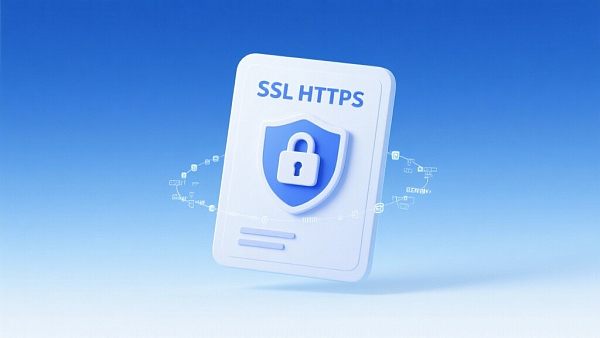
Understanding the technical principles of SSL is the foundation for correct deployment and optimization:
1. SSL/TLS Handshake Encryption Principle
Principle: When a user visits an HTTPS website, a **"handshake" process** occurs between the browser and the server. The core of this process is **exchanging and verifying digital certificates**, then negotiating a **symmetric encryption key**. Technical application: After a successful handshake, all data transmissions use this key for encryption, ensuring information cannot be read by third parties.
2. The Combined Principle of Asymmetric and Symmetric Encryption
Principle: SSL certificates use **asymmetric encryption (public and private keys)** to securely **transmit symmetric keys**. Once the symmetric key is securely transmitted, subsequent data transmissions use **symmetric encryption**. Technical application: This is because **symmetric encryption is much faster than asymmetric encryption**, ensuring security without severely impacting the loading speed of foreign trade independent websites.
3. Certificate Trust Chain (Trust Chain) Verification Principle
Principle: A browser trusts an SSL certificate not because it directly recognizes the certificate but because it trusts the **certificate authority (CA)**. Certificates form a trust chain: **Root Certificate -> Intermediate Certificate -> End Certificate**. Technical application: During deployment, ensure **intermediate certificates** are correctly installed on the server; otherwise, some users will receive security warnings.
4. HTTP Strict Transport Security (HSTS) Forced Secure Connection Principle
Principle: HSTS is a security policy instructing browsers to **always connect via HTTPS**, even if the visitor inputs HTTP. Technical application: By adding HSTS Header to server configurations, it effectively resolves potential **protocol downgrade attacks** and **mixed content issues**, a must-have security configuration for foreign trade independent websites.
5. OCSP Stapling Performance Optimization Principle
Principle: OCSP Stapling allows servers to directly provide **certificate validity proofs** during the TLS handshake process, eliminating the need for browsers to query CA servers. Technical application: This significantly **reduces TLS handshake delays**, especially crucial for globally accessed foreign trade independent websites, improving site loading speed and Core Web Vitals (CWV).
3. The 4 Core Technical Features and Applications of SSL Certificates for Foreign Trade Independent Websites
1. Technical Feature: Application Comparison of Three Certificate Types in Foreign Trade
2. Practical Application: SEO Techniques for Resolving "Mixed Content" Issues
Application: After migrating from HTTP to HTTPS, if resources (images, scripts, CSS) are still loaded via HTTP, **mixed content warnings** will appear. SEO techniques: Use **site crawling tools** to detect all links, changing all internal resource URLs to **relative URLs or HTTPS protocols**, ensuring the address bar displays complete security.
3. Practical Application: Wildcard Certificate Applications for Foreign Trade Independent Websites
Application: For foreign trade independent websites with multiple subdomains (e.g., German site de.xxx.com, Japanese site jp.xxx.com, blog blog.xxx.com), **wildcard SSL certificates (*.xxx.com)** are the best choice. They protect all subdomains with one certificate, greatly simplifying multi-site management and renewal processes.
4. Practical Application: Certificate Expiry Alerts and Automated Renewal
Application: Certificate expiry leads to site downtime and SEO trust collapse. Professional operations should set **at least 30-day** certificate expiry alerts. For DV certificates, leverage **ACME protocols** for automated renewals; for OV/EV certificates, initiate manual review processes in advance.
4. SSL Certificate Deployment vs. No Certificate: Comparative Analysis and Industry Scenarios
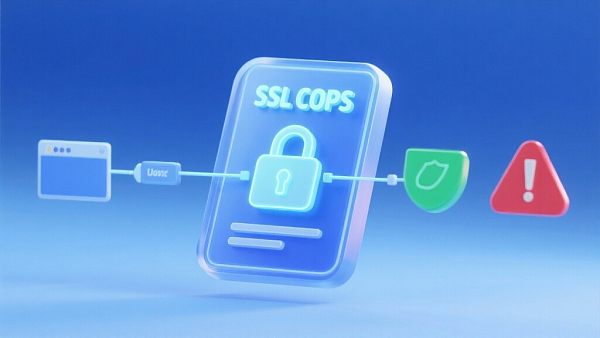
1. HTTPS Deployment vs. Pure HTTP Website Comparative Analysis
2. Typical Foreign Trade Industry Scenarios for SSL Certificate Deployment
Different foreign trade industries have varying SSL certificate needs:
- **B2B High-Value Custom Services:** Strongly recommend **OV/EV certificates**. High-value custom businesses demand extreme identity and trust verification, where EV certificates provide top-tier credibility.
- **Cross-Border B2C E-Commerce Platforms:** **Must use OV or EV certificates**. Directly involving credit cards and user privacy data, security requirements are highest.
- **OEM/ODM Promotional Sites:** At least use **DV certificates** to ensure SEO rankings and basic user experience are unaffected.
3. SSL Certificate Standard Certifications and Professional Norms
Professional standards for SSL certificates are primarily set by the following institutions and norms:
- **CA/Browser Forum:** An industry organization establishing **unified verification and issuance standards** for DV, OV, and EV certificates.
- **Professional Certifications:** Certificate authorities (CAs) like DigiCert, Sectigo, and Let's Encrypt must pass **WebTrust for CAs** audits.
- **Encryption Standards:** Certificates must use **SHA-256 and above** hash algorithms, with key lengths typically **2048-bit and above**.
5. Upgrade Your SSL Certificate Immediately to Build a Secure Global Trust Portal!
Does your independent website still display "Not Secure" warnings? Are you losing high-intent customers due to improper SSL deployment? Our expert team specializes in **SSL certificate selection (DV/OV/EV), TLS 1.3 ultra-fast deployment, and complete HTTPS SEO migration**. We help ensure your website is secure and compliant while leveraging SSL's trust benefits to effectively improve inquiry conversion rates. Book a **free "Foreign Trade Independent Website Security Certificate Diagnosis"** now to receive a professional certificate selection and HTTPS optimization plan!
Click for Free Certificate DiagnosisFAQ
1. What are the differences between free DV certificates and paid OV/EV certificates in terms of SEO impact on foreign trade independent websites?
Answer: **In terms of SEO ranking signals, the HTTPS weighting for DV, OV, and EV certificates is the same**. However, paid OV/EV certificates provide **higher identity verification**, significantly **enhancing user trust in your brand and inquiry conversion rates** in B2B foreign trade scenarios, offering commercial value that DV certificates cannot provide.
2. Will website speed slow down after deploying SSL certificates? How to resolve this?
Answer: Theoretically, encryption handshakes may slightly slow things down, but modern technology has largely eliminated this impact. Solutions: 1) **Use TLS 1.3 protocol**. 2) **Enable HSTS and OCSP Stapling**. 3) Ensure server configurations and CDN optimizations are well-tuned. Professional SSL deployment can even **achieve speed gains via HTTP/2 protocols** to offset encryption delays.
3. How to check if my foreign trade independent website has "mixed content" issues?
Answer: The simplest method is to **press F12 in a browser (e.g., Chrome) to open developer tools** and check the Console tab. If mixed content exists, the console will display **clear yellow or red warnings**. Professional practice involves using tools like **Screaming Frog** for full-site scans.
4. What are the impacts on SEO rankings and customers after SSL certificate expiry?
Answer: **The impact is catastrophic**. Google will mark your site in search results, and visitors will see a **full-screen red "Your connection is not private" warning**, rendering the site inaccessible. This immediately causes **traffic to zero, ranking crashes, and complete loss of brand trust**.

Customer Reviews
Mr. Li, Middle East Oil Machinery Equipment Exporter
"After upgrading from DV certificate to **OV organization validation certificate**, our company name was directly displayed in the address bar. Customer feedback indicated **'it looks more legitimate now'**. This minor change brought a significant boost in credibility—**high-value inquiry submission rates increased by 15% within 3 months**, proving that trustworthiness and conversion rates are positively correlated."
Manager Wang, European Cross-border E-commerce Platform
"Due to incomplete HTTPS migration, our old website had persistent **mixed content issues**, causing abnormal access for users in certain regions. Through professional **HSTS and mixed content scanning optimization**, we completely resolved security warnings. Google's trust in our site visibly recovered—**overall SEO rankings received significant boosts during subsequent core updates**."
![Still worried about your foreign trade website's slow loading? Learn more about global CDN acceleration Still worried about your foreign trade website's slow loading? Learn more about global CDN acceleration]() Still worried about your foreign trade website's slow loading? Learn more about global CDN accelerationStruggling with slow loading and vulnerability to attacks on your independent foreign trade website? YiYingBao offers global CDN acceleration, intelligent DDoS protection, and automated SSL certificate deployment, comprehensively enhancing access speed and security. Combined with AI translation engines, Yandex advertising, Meta ad agency services, and intelligent website-building systems, we empower businesses to efficiently expand into overseas markets. Supporting multilingual localization and high-conversion design, we cover everything from website construction to lead generation. Get a customized solution now and open a high-speed channel for your brand's global expansion.
Still worried about your foreign trade website's slow loading? Learn more about global CDN accelerationStruggling with slow loading and vulnerability to attacks on your independent foreign trade website? YiYingBao offers global CDN acceleration, intelligent DDoS protection, and automated SSL certificate deployment, comprehensively enhancing access speed and security. Combined with AI translation engines, Yandex advertising, Meta ad agency services, and intelligent website-building systems, we empower businesses to efficiently expand into overseas markets. Supporting multilingual localization and high-conversion design, we cover everything from website construction to lead generation. Get a customized solution now and open a high-speed channel for your brand's global expansion.![New Trends in Social Media Marketing: How Can Independent Overseas E-commerce Sites Master Overseas Social Media? New Trends in Social Media Marketing: How Can Independent Overseas E-commerce Sites Master Overseas Social Media?]() New Trends in Social Media Marketing: How Can Independent Overseas E-commerce Sites Master Overseas Social Media?Discover how independent e-commerce sites can achieve global growth through overseas social media! This article details effective operational strategies for platforms like Facebook and LinkedIn, covering key techniques such as Google Ads optimization and Yandex promotion, while showcasing success stories from Shenzhen city partners. Learn how to boost conversions using AI translation engines, global servers, and Meta advertising agencies, and gain insights into the latest 2024 social media marketing trends. Get professional website building services and SSL certificate solutions now to multiply your independent site's performance!
New Trends in Social Media Marketing: How Can Independent Overseas E-commerce Sites Master Overseas Social Media?Discover how independent e-commerce sites can achieve global growth through overseas social media! This article details effective operational strategies for platforms like Facebook and LinkedIn, covering key techniques such as Google Ads optimization and Yandex promotion, while showcasing success stories from Shenzhen city partners. Learn how to boost conversions using AI translation engines, global servers, and Meta advertising agencies, and gain insights into the latest 2024 social media marketing trends. Get professional website building services and SSL certificate solutions now to multiply your independent site's performance!![Global Server Selection Guide: How to Achieve High-Speed Access for Independent E-commerce Sites? Global Server Selection Guide: How to Achieve High-Speed Access for Independent E-commerce Sites?]() Global Server Selection Guide: How to Achieve High-Speed Access for Independent E-commerce Sites?How Can Independent E-commerce Sites Achieve Global High-Speed Access? This guide provides an in-depth analysis of server selection strategies, covering critical aspects such as SSL certificate deployment, AI translation engine integration, and Google Ads optimization. E-Yingbao offers Shenzhen city partners a full-stack solution—from independent e-commerce site development to Meta advertising agency services—helping you build high-conversion independent sites. Discover how global server deployment can boost access speeds, reduce bounce rates, and drive business growth.
Global Server Selection Guide: How to Achieve High-Speed Access for Independent E-commerce Sites?How Can Independent E-commerce Sites Achieve Global High-Speed Access? This guide provides an in-depth analysis of server selection strategies, covering critical aspects such as SSL certificate deployment, AI translation engine integration, and Google Ads optimization. E-Yingbao offers Shenzhen city partners a full-stack solution—from independent e-commerce site development to Meta advertising agency services—helping you build high-conversion independent sites. Discover how global server deployment can boost access speeds, reduce bounce rates, and drive business growth.![Unveiling the 7 Core Elements for High-Conversion Website Building in Foreign Trade Unveiling the 7 Core Elements for High-Conversion Website Building in Foreign Trade]() Unveiling the 7 Core Elements for High-Conversion Website Building in Foreign TradeUnveiling the 7 core elements for building a high-conversion independent website for foreign trade! From localized services through Shenzhen city partners to secure SSL certificate deployment, from Google Ads and Yandex promotion strategies to Meta advertising agency social media marketing, combined with AI translation engines and global server deployment, we create a high-conversion independent website. With ten years of technological expertise, YiYingBao provides a one-stop solution from website building to marketing, helping you achieve a 200% increase in advertising conversion rates. Learn how to break through the bottlenecks in foreign trade growth now!
Unveiling the 7 Core Elements for High-Conversion Website Building in Foreign TradeUnveiling the 7 core elements for building a high-conversion independent website for foreign trade! From localized services through Shenzhen city partners to secure SSL certificate deployment, from Google Ads and Yandex promotion strategies to Meta advertising agency social media marketing, combined with AI translation engines and global server deployment, we create a high-conversion independent website. With ten years of technological expertise, YiYingBao provides a one-stop solution from website building to marketing, helping you achieve a 200% increase in advertising conversion rates. Learn how to break through the bottlenecks in foreign trade growth now!![SSL Certificate Selection Guide for Independent E-commerce Sites: Ensuring Security and Trust SSL Certificate Selection Guide for Independent E-commerce Sites: Ensuring Security and Trust]() SSL Certificate Selection Guide for Independent E-commerce Sites: Ensuring Security and TrustSSL Certificate Selection Guide for Independent E-commerce Sites: Ensuring Security and Trust. This article, authored by the expert team at Shenzhen City Partner Yingbao, provides an in-depth analysis of how to choose high-performance SSL certificates tailored for independent e-commerce sites. From encryption levels and browser compatibility to SEO optimization benefits, it helps you build a secure, trustworthy, and high-conversion independent site. Covering the core value of SSL certificates, five golden standards for selection, practical case studies, and advanced considerations, this guide lays the technical foundation for Google Ads and Yandex promotions. Get your exclusive SSL configuration plan now to build an impenetrable security barrier for your independent site!
SSL Certificate Selection Guide for Independent E-commerce Sites: Ensuring Security and TrustSSL Certificate Selection Guide for Independent E-commerce Sites: Ensuring Security and Trust. This article, authored by the expert team at Shenzhen City Partner Yingbao, provides an in-depth analysis of how to choose high-performance SSL certificates tailored for independent e-commerce sites. From encryption levels and browser compatibility to SEO optimization benefits, it helps you build a secure, trustworthy, and high-conversion independent site. Covering the core value of SSL certificates, five golden standards for selection, practical case studies, and advanced considerations, this guide lays the technical foundation for Google Ads and Yandex promotions. Get your exclusive SSL configuration plan now to build an impenetrable security barrier for your independent site!![Why is automatic TDK generation the first step in SEO optimization for foreign trade independent websites? Why is automatic TDK generation the first step in SEO optimization for foreign trade independent websites?]() Why is automatic TDK generation the first step in SEO optimization for foreign trade independent websites?Automatic TDK generation is the crucial first step in SEO optimization for foreign trade independent websites! Yisoubao's AI-driven TDK auto-generation service helps foreign trade websites quickly adapt to 20+ language markets, significantly improving SEO scores and inquiry quality. Through precise multilingual TDK settings, AI+SEO dual-engine optimization systems, combined with global CDN acceleration and SSL certificates for independent foreign trade websites, achieve a 30% increase in search rankings and a 52% improvement in inquiry quality. Get professional solutions immediately to help your laser engraving machines and other products attract more overseas customers!
Why is automatic TDK generation the first step in SEO optimization for foreign trade independent websites?Automatic TDK generation is the crucial first step in SEO optimization for foreign trade independent websites! Yisoubao's AI-driven TDK auto-generation service helps foreign trade websites quickly adapt to 20+ language markets, significantly improving SEO scores and inquiry quality. Through precise multilingual TDK settings, AI+SEO dual-engine optimization systems, combined with global CDN acceleration and SSL certificates for independent foreign trade websites, achieve a 30% increase in search rankings and a 52% improvement in inquiry quality. Get professional solutions immediately to help your laser engraving machines and other products attract more overseas customers!![SEO + SEM integrated marketing how to help companies break through the traffic bottleneck? SEO + SEM integrated marketing how to help companies break through the traffic bottleneck?]() SEO + SEM integrated marketing how to help companies break through the traffic bottleneck?How can enterprises break through the traffic bottleneck through SEO + SEM integrated marketing? YiYingBao AI + SEO dual engine optimization system, combined with independent station SEO optimization, foreign trade website SEO, foreign trade independent station global CDN acceleration and SSL certificate security deployment, help enterprises to improve the quality of inquiry 200%. This article in-depth analysis of the core value of SEO + SEM integrated marketing, revealing the whole link traffic breakthrough combat methodology, covering AI writing, small language website TDK settings, TDK automatic generation of SEO optimization services and other key strategies, to help enterprises achieve low customer acquisition costs and efficient conversion.
SEO + SEM integrated marketing how to help companies break through the traffic bottleneck?How can enterprises break through the traffic bottleneck through SEO + SEM integrated marketing? YiYingBao AI + SEO dual engine optimization system, combined with independent station SEO optimization, foreign trade website SEO, foreign trade independent station global CDN acceleration and SSL certificate security deployment, help enterprises to improve the quality of inquiry 200%. This article in-depth analysis of the core value of SEO + SEM integrated marketing, revealing the whole link traffic breakthrough combat methodology, covering AI writing, small language website TDK settings, TDK automatic generation of SEO optimization services and other key strategies, to help enterprises achieve low customer acquisition costs and efficient conversion.![The inappropriate choice of SSL certificate for foreign trade independent website will lead to loss of inquiry? The inappropriate choice of SSL certificate for foreign trade independent website will lead to loss of inquiry?]() The inappropriate choice of SSL certificate for foreign trade independent website will lead to loss of inquiry?Inappropriate choice of SSL certificate for foreign trade independent station will directly affect the security of the website and user trust, resulting in the loss of inquiries. In this article, we analyze how SSL certificate affects the conversion rate of inquiry, compare the application scenarios of DV/OV/EV certificates, and reveal the synergistic effect of SSL and SEO optimization of independent websites. You will learn: why Google uses HTTPS as a ranking signal, how EV certificates can increase order amount by 34%, and the 5 key points of technology deployment. and 5 key points of technology deployment. As an enterprise service SaaS expert, EYB provides AI+SEO dual-engine optimization system to help foreign trade enterprises improve global CDN acceleration effect through correct SSL certificate configuration and realize inquiry quality leap. Get professional solutions now to build a safe and trustworthy internationalized e-commerce portal!
The inappropriate choice of SSL certificate for foreign trade independent website will lead to loss of inquiry?Inappropriate choice of SSL certificate for foreign trade independent station will directly affect the security of the website and user trust, resulting in the loss of inquiries. In this article, we analyze how SSL certificate affects the conversion rate of inquiry, compare the application scenarios of DV/OV/EV certificates, and reveal the synergistic effect of SSL and SEO optimization of independent websites. You will learn: why Google uses HTTPS as a ranking signal, how EV certificates can increase order amount by 34%, and the 5 key points of technology deployment. and 5 key points of technology deployment. As an enterprise service SaaS expert, EYB provides AI+SEO dual-engine optimization system to help foreign trade enterprises improve global CDN acceleration effect through correct SSL certificate configuration and realize inquiry quality leap. Get professional solutions now to build a safe and trustworthy internationalized e-commerce portal!

